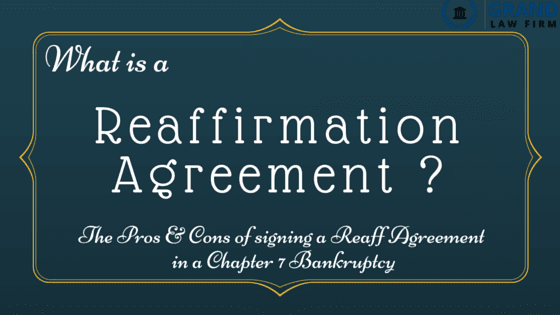A reaffirmation agreement is an agreement between a creditor and a debtor(s) that waives the discharge of a particular debt that would otherwise be discharged in a pending chapter 7 bankruptcy case. Essentially, a reaffirmation agreement is an agreement to keep a debt and the property securing that debt, and to make payments toward that debt rather than having the debt wiped out in a bankruptcy discharge.
Reaffirmation agreements come up in chapter 7 bankruptcy cases when the debtor or debtors wish to maintain a secured debt. People most often choose to, or consider, reaffirming debts related to their vehicles and homes but there are other items such as furniture that a debtor or debtors may consider reaffirming.
The terms of a reaffirmation agreement are based on the original loan agreement and can be complicated and varied depending on what creditor and property you’re dealing with. It is always best to sit down with an experienced Louisiana Bankruptcy attorney and discuss your specific situation before signing a reaffirmation agreement; but here is a basic run-down of the pros and cons of reaffirmation agreements within a Louisiana bankruptcy case.
Reaffirmation Agreements can generally be broken down into 3 categories: Mortgages, Cars, and Other Collateral
-
Mortgages:
-
The terms of mortgage reaffirmation agreements are typically the same as
the original mortgage
-
Pros to consider:
- Reaffirming the debt owed on your home would mean you could continue to live in the home as long as you stayed current on payments
- Signing a mortgage reaffirmation can boost your credit score because, as long as your making your payments and making them on time, your mortgage company will be reporting that activity to the credit bureaus
- If you choose to sign a reaffirmation agreement on your mortgage, your mortgage company will be obligated to continue providing you with your payment history which could be helpful in the event you need to refinance in the future
-
Cons to consider:
- If you reaffirm your home mortgage and default on your payments then you will owe the deficiency, additionally, if you continue to miss payments, your finance company will foreclose on your home
-
What happens if you would like to keep your home but do not feel comfortable
signing a reaffirmation agreement for your mortgage?
- It’s hard to say, every finance company is different, but, typically if you are up-to-date on the payments of the original mortgage agreement, most finance companies allow you to continue living in the home and respect the mortgage agreement regardless of the bankruptcy discharge. However, if you choose not to reaffirm your mortgage, your finance company is not required to report your payments to the credit bureaus (so you will have no payment history in the event of default or need to refinance or build credit). Additionally, the bank or finance company is not required to provide you with the payment history so it will be critical that you keep your own records of any and all payments made.
-
Pros to consider:
-
The terms of mortgage reaffirmation agreements are typically the same as
the original mortgage
-
Cars:
- Here again, the terms of a car loan reaffirmation agreement are typically the same as the original loan agreements.
-
Pros to consider:
- As long as you keep your payments current you can maintain possession of your vehicle
Universal Rules:
- Signing a reaffirmation is completely voluntary
- Either your attorney or a judge will have to sign the reaffirmation agreement as reasonable
- You must be current on the loan you wish to reaffirm
- If you default on a reaffirmation agreement the creditor can, and most likely will, move to take possession of the property
- If you default on a reaffirmation agreement you will owe any deficiency


